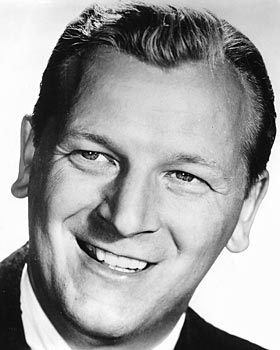Les Baxter facts for kids
Quick facts for kids
Les Baxter
|
|
|---|---|
 |
|
| Background information | |
| Birth name | Leslie Thompson Baxter |
| Born | March 14, 1922 Mexia, Texas, U.S. |
| Died | January 15, 1996 (aged 73) Newport Beach, California, U.S. |
| Genres | Lounge music, exotica |
| Occupation(s) |
|
| Instruments | Piano |
Leslie Thompson Baxter (March 14, 1922 – January 15, 1996) was a talented American musician, composer, and conductor. He was known for creating a unique style of music called exotica. This music often sounded like it came from faraway, exotic places. Les Baxter also wrote music for over 250 radio shows, TV programs, and movies.
Contents
Early Life and Musical Start
Les Baxter loved music from a young age. He studied piano at the Detroit Conservatory of Music. Later, he moved to Los Angeles to continue his studies at Pepperdine College. In 1943, he played saxophone for the Freddie Slack big band.
Even though he was a skilled pianist, he decided to become a popular music singer. When he was 23, he joined a singing group called Mel Tormé's Mel-Tones. He sang on famous records with Artie Shaw, like "What Is This Thing Called Love?"
A Career in Music
In 1950, Les Baxter started working for Capitol Records. He arranged and conducted music for many artists. He helped create two early hit songs for Nat King Cole: "Mona Lisa" and "Too Young".
Creating Exotica Music
Les Baxter also recorded the first album for Yma Sumac, called "Voice of the Xtabay." Many people consider this one of the first "exotica" recordings. Exotica music uses sounds and instruments to make listeners feel like they are in a tropical or faraway place. In 1951, he recorded "Quiet Village," which later became a big hit for another artist, Martin Denny.
Hit Songs and Albums
With his own orchestra, Les Baxter released several popular songs. These included "Ruby" (1953), "Unchained Melody" (1955), and "The Poor People of Paris" (1956). His version of "Sinner Man" (1956) is also well-known. It featured changing speeds, grand orchestral sounds, and background vocals.
"Unchained Melody" was a huge success for Baxter. It sold over one million copies and earned a gold disc. "The Poor People of Paris" also sold more than a million copies. He also created successful concept albums, which were collections of his own orchestral music. Some of these were Le Sacre Du Sauvage, Festival Of The Gnomes, Ports Of Pleasure, and Brazil Now.
Music for Movies and TV
Les Baxter wrote music for many films, especially in the 1960s and 1970s. He worked for a studio called American International Pictures. There, he composed scores for Roger Corman's Edgar Allan Poe films and other horror and beach party movies. Some of these films include House of Usher, The Pit and the Pendulum, The Raven, Muscle Beach Party, and Beach Blanket Bingo.
He even wrote a new score for the 1970 horror film Cry of the Banshee. It is said that he once composed, arranged, and recorded an entire movie score for The Yellow Tomahawk (1954) in just three hours!
Les Baxter also worked as a musical director for radio shows like The Halls of Ivy and the Bob Hope and Abbott and Costello shows. Later in his career, when movie work slowed down, he wrote music for theme parks like SeaWorld.
Les Baxter passed away in Newport Beach, California, at 73 years old. He is buried at Pacific View Memorial Park.
Awards and Recognition
Les Baxter has a special star on the Hollywood Walk of Fame. You can find it at 6314 Hollywood Blvd.
Selected Filmography
|
|
Discography
Les Baxter released many albums and singles throughout his career. Here are some of his notable works:
Albums and Soundtracks
- (1950) Yma Sumac: Voice of the Xtabay (a very early exotica album)
- (1951) Ritual of the Savage (Le sacre du sauvage)
- (1955) Tamboo!
- (1957) Ports of Pleasure
- (1958) Space Escapade
- (1959) Les Baxter's African Jazz
- (1960) House of Usher / The Fall of the House of Usher (movie soundtrack)
- (1966) Brazil Now
- (1968) Moog Rock (using an early electronic synthesizer)
- (1970) Cry of the Banshee (movie soundtrack)
Hit Singles
- (1952) "Blue Tango"
- (1953) "Ruby"
- (1955) "Unchained Melody" (a million-seller!)
- (1956) "The Poor People of Paris" (another million-seller!)

